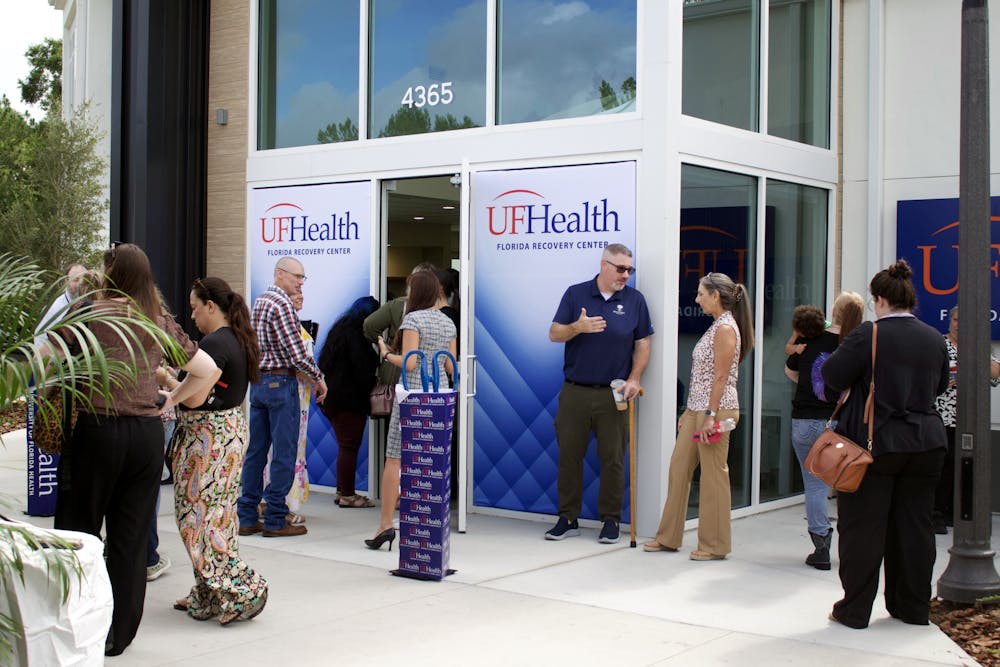UF Health held a ribbon-cutting ceremony celebrating the new Florida Recovery Center Tuesday morning.
The FRC has operated from its previous location near Williston Road on Southwest 13th Street since 1999, but will transition to a larger facility behind the UF Health Springhill medical complex, according to FRC medical director Scott Teitelbaum.
David Fields, FRC’s executive director, said the move was prompted by the need for greater facilities and the older conditions of the building. Being behind the psychiatric hospital will give the center more of a “campus” feel, which the staff looks forward to, he said.
Shadowing opportunities will also be available for undergraduate students, Fields said.
Roughly half of the center’s patients have a concurrent mental health issue alongside their addiction, he said, and the new location will be more accommodating.
“Whatever sort of service you need, it's right there,” Fields said.
The new building will increase patient capacity from 80 to 124 beds with both single and double occupancy rooms. The campus consists of residential, therapeutic and recreational spaces, such as a swimming pool, gym, outdoor recreation area and pickleball court.
An administrative building will offer services like addiction evaluations, group and individual therapy, lectures and outpatient care.
The FRC has four levels of care: inpatient residential housing, partial hospitalization, intensive outpatient and outpatient.
Intensive outpatient care is offered to patients living at home. Outpatient treatment is when patients visit the facility to see a therapist.
“We're partial hospitalization with housing, but we're looking at a residential level of care, which will allow us to safely treat people with some more complex issues,” Fields said. “We're moving toward providing all four levels of care, which is really exciting.”
The FRC helps underserved populations in Gainesville. It is looking to expand partnerships with local organizations like GRACE Marketplace, a homeless services agency.
“In the homeless population, there's a high acuity of mental health and substance use issues,” he said. “That's a desire I have for FRC, is that we would be able to provide at least some services for folks that are indigent in our community.”
The center will focus on engaging with the Gainesville community whenever possible. It will participate in community events to educate the public and further develop partnerships with organizations like the UF Counseling and Wellness Center and the Student Health Care Center.
The FRC call center will also assist individuals without insurance or adequate financial resources by referring them to other providers or resources during the call.
“We're always trying to link people over phone calls,” Fields said. “We want to give them some resources where it's like, ‘Here's some place you can go to get help.’”
One of the center’s specialties is treating healthcare professionals who need treatment themselves, he said. Doctors and nurses who are considered to be safety-sensitive, or struggling with addiction themselves, can receive treatment for their addiction until they can return and safely treat patients while in recovery.
Ben Lewis, a UF College of Medicine professor, underscored the importance of residential recovery facilities.
“One of the most important things is they quite literally remove people from their environment and give them a place to change and recover,” Lewis said.
A close support network is crucial for recovery, he added, which makes residential care valuable for some patients.
“It's a collection of some of the best clinicians in the world doing work at one of the top universities,” he said. “You couldn't be in a better place if you're struggling with a substance use disorder and need the space.”
However, recovery is not always linear, he said..
“You can talk about individuals who are in recovery but still use substances,” Lewis said. “There's a whole approach to addiction harm reduction.”
It makes university involvement in recovery important because higher education institutions have broad access to resources, he said.
The FRC has been ranked the No. 1 addiction treatment center in Florida and No. 5 nationwide by Newsweek. Scott Teitelbaum, FRC’s medical director, attributes the center's success to UF Health resources and its emphasis on ethics.
The depth of resources associated with UF Health sets it apart, according to Teitelbaum, as a wide range of care is available for patients with co-occurring medical issues, such as both orthopedic and cardiac care. He also cites the center’s emphasis on ethics and high-quality care rather than profits as a main reason for its success.
“We've always kept the focus on our primary goal to treat patients and help their families,” Teitelbaum said.
Contact Elizabeth Maguire at emaguire@alligator.org. Follow her on X @emaguireee.






